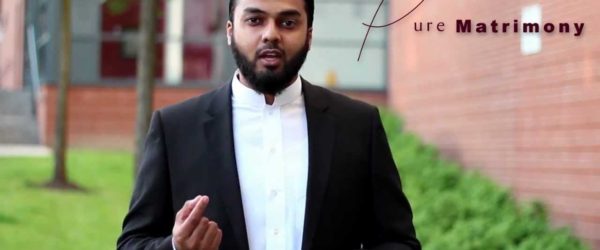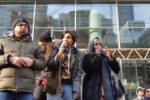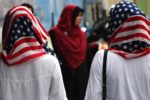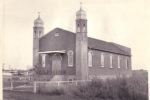A few weeks ago Musleh Khan, a chaplain working for the Toronto Police, was all over the media for his comments on women and obedience on a 2013 webinar for couples. In the webinar titled “The Heart of the Home: the Rights and Responsibilities of a Wife” (the video has been taken down), he asserts what many other religious figures – Muslim and otherwise – have in the past: that women must obey their husbands and that men have the “right” to sex whenever they feel like it. Sex and a husband’s satisfaction are defined, according to Khan, almost like a sixth religious pillar. For those of us who navigate a variety of religious spaces – and let’s be honest, even secular ones – this probably does not come as a surprise. Patriarchy knows no boundaries.
Khan has been called out by a variety of Muslim organizations such as the Canadian Council of Muslim Women and Universalist Muslims, and secular groups like the Toronto Police Union. A lot of the narratives around Khan rely on drawing a sharp distinction between “Good Muslims” and “Bad Muslims,” the latter being associated with Orthodox Muslim communities, which are often depicted as inherently violent and patriarchal. This rhetoric is flawed in that one can be Orthodox and not engage or support gendered violence, just like one can be a “progressive” or “liberal” Muslim and perpetuate patriarchal, sexist and violent behaviours. Further, it is a narrative that that flirts with right-wing Islamophobia, institutional white supremacy and white-feminisms holding anti-immigration attitudes.
Khan, on his end, issued a sort of comment, not quite an apology, where he states that he will try to be mindful of his choice of language when talking about Muslim women’s roles, which really is like saying, “I am sorry YOU feel this way.” But despite the outrage and calls to fire Khan, the Toronto Police is retaining him as a volunteer chaplain. It is also relevant to note, that at least in the mainstream Canadian media, the chaplaincy community, Muslim and otherwise, has remained silent on the situation.
Criticisms against Khan also come at a time where younger Muslims and those born in Canada have been pushing for local chaplains, Imams and Sheikhs to be trained and hired. One of the things that is touchy these days between Muslim youth and mosque spaces is that Sheikhs and Imams are often these old guys trained in Saudi Arabia, Egypt, Iran, etc., and who have little or no context of what it means to be a young Muslim in Canada. In many instances, they barely speak the languages of their congregations.
However, the idea that issues of violence against women would be addressed simply by exchanging current religious leaders with locally-trained ones seems simplistic. Not to mention the fact that these calls for local recruitment of chaplains, Imams and Sheikhs have been coopted by police and surveillance efforts to “curve” extremism under the assumption that it is “the other” that brings religious extremism into Canada (racism and Islamophobia 101).
Khan is one of those Saudi-trained chaplains, but this fact, I feel, does not make the situation any easier to analyze.What is interesting to me is the ways in which critiquing Khan for his patriarchal and sexist views has released police forces from any responsibility for recruiting and retaining employees and volunteers, who like Khan, hold these views. Let’s not kid ourselves. Khan may be a bigot for all I know, but his work within an institution designed to perpetrate violence against racialized people, particularly women and LGBTIQ communities, does not exist in a vacuum.
Police brutality, gendered violence and sexual harassment are prevalent in Canada. The communities that I navigate – be they Muslim, Indigenous or Latinx – are often targets of this violence. Not to mention the fact that anti-Blackness and police brutality against Black communities is pretty normalized across the country. Why wouldn’t it be? In Canada, police forces – whether the Royal Canadian Mounted Police (RCMP) or your local police force – were created to contain Indigenous unrest, to control Black bodies and to deal with anyone else who may be conceived as “the other.” Let’s not forget that.
Khan is being retained because the Toronto Police, as any police department, remains a highly patriarchal and white supremacist institution with a mandate to “keep peace and protect” while controlling racialized bodies. Thus, Khan is of course problematic, but in this discussion we must not forget the broader need to critique the police industrial complex. For instance, in the past few years, there has been extensive documentation of the ways in which police forces across Canada fail Indigenous communities, primarily women, when they are at risk of violence (including domestic violence) or when someone goes missing. Just a month ago, Inuit artist Annie Pootogook was found dead in Ottawa. Some of the first police reactions we observed, were those of police officers making racist comments about Pootoogook. Several Indigenous women, and Human Rights Watch, reported instances of sexual violence at the hands of police officers. Moreover, earlier this year, Assembly of First Nations National Chief Perry Bellegarde said that the police “didn’t put enough human and financial resources into the research and the investigation surrounding all these cases involving First Nations women,” pointing to the wide-spread racism in the force and arguing that the police must acknowledge blame in the violence against Indigenous women.
Afro-Canadians also have a long history of police brutality in Canada, primarily in urban settings. Although Black men are often the targets of violence, particularly in recent years, police brutality has affected Black women as well. Black communities are also disproportionately incarcerated in Canada, being the second largest group after Indigenous peoples, and are often threatened with deportation.
When it comes to Muslims, Islamophobic behaviours are obvious. My own experience dealing with the Ottawa police has showed me that the police is not an institution I can rely on as an immigrant, a racialized woman and as a Muslim. Another example from Ottawa is that of Abdirahman Abdi, a Black man and a Muslim, who was killed by Ottawa police officers in a racially-motivated attack. We may have anti-Islamophobia motions being passed across the country, but the reality of things is that Muslims, particularly Black Muslims, remain “others” when dealing with police institutions, as much as we would like to think otherwise.
And let’s not forget about the recent RCMP report on sexual harassment and violence, which shows the prevalence of sexualized violence against women within the institution. The findings were shocking for many Canadians who hold police institutions in high esteem, particularly after they were accused of not being able to deal with the prevalence of bullying and violence. But I think this is just the tip of the iceberg regarding gendered and sexualized violence. If these things are normalized within the RCMP, chances are they are just as common, if not more, in urban police departments. In fact, the Toronto police has had several human rights complaints launched against the department for sexual harassment and gendered violence. Some of the complainants ended up being fired.
All this to say that gendered violence, sexual harassment, patriarchal behaviours, sexism and bigotry are normal behaviours within the police industrial complex. And while that does not exonerate Khan for his explicit gendered and violent religious opinions, it does provide a context in which these can coexist with an institution that supposedly protects people, including women.
So, is the answer firing him? I personally do not believe so. If such were the case, Khan would move on to another position, perhaps with a mosque or another government department, without his views being challenged. What is more, the police industrial complex will go unexamined and uncritiqued once Khan is out. And, at least for me, that is an important part of all this situation.
So, how do we move forward? Well, first, as Muslims it is essential that we become aware of the ways in which the police industrial complex perpetuates violence against racialized people and gendered violence against women and racialized LGBTIQ communities. It is not enough to call people out when they make violent comments and ask government institutions to fire them. Long-term change cannot be achieved like that. Similarly, it is important to check ourselves when calling people out. Pointing out at bigotry and sexism does not equate to participating in Islamophobic narratives. Second, while I cannot foresee the dismantling of the police industrial complex anytime soon, I think educational efforts on racialized, gendered and sexual violence are much needed. And while I do not have much faith on government and police institutions, I hope that Muslim communities across the country will urge chaplains, Imams and Sheikhs to have a critical understanding on this violence. My advice? Let Muslim women and LGBTIQ folks, doing the work on the ground, be hired to train them locally. This task is not easy and it requires transformation of very prevalent and normalized behaviours among Muslim and non-Muslim cissexual men; yet, at least in my view, this is the responsibility of Muslim communities, not only of Muslim women. If we seriously want to tackle violence against Muslims and Islamophobia, a critical analysis of violence against Muslim women, from within the communities, is long overdue.
This small list features some Muslim organizations/consultants/activists specializing on equity, racialized violence, gendered violence and sexual violence.




